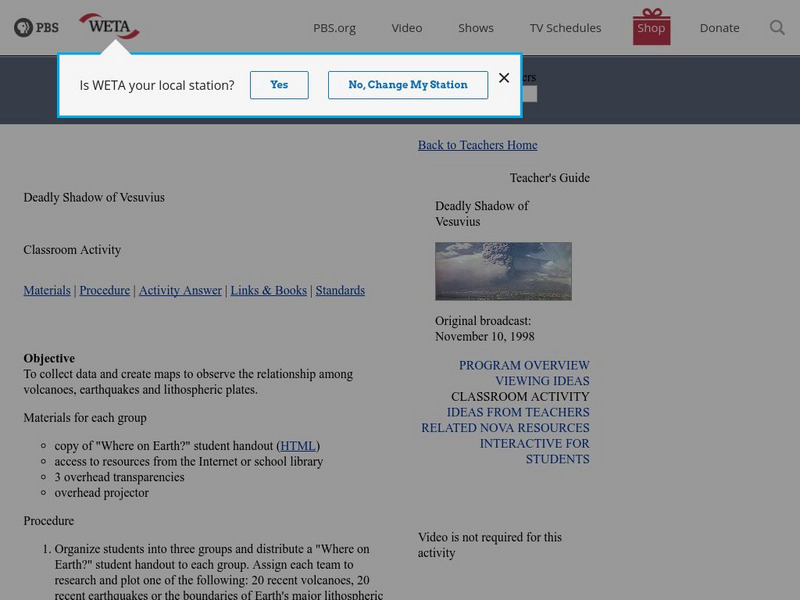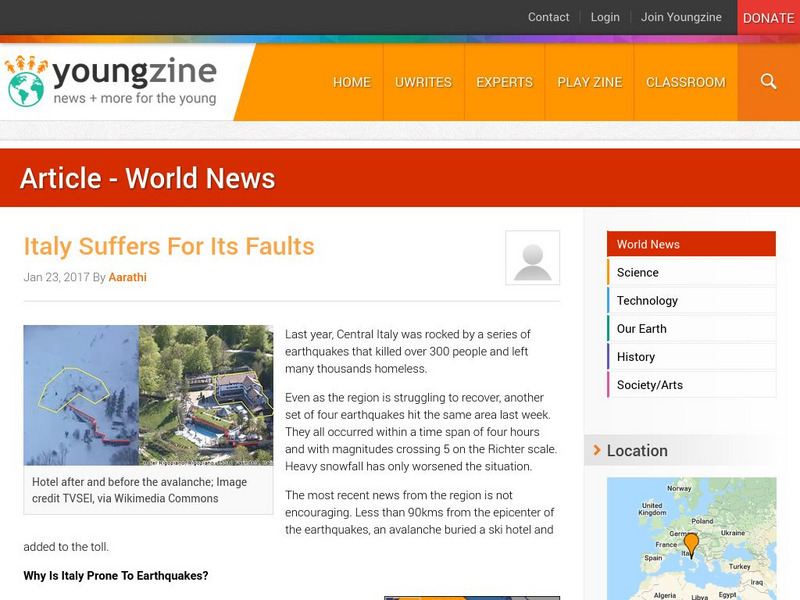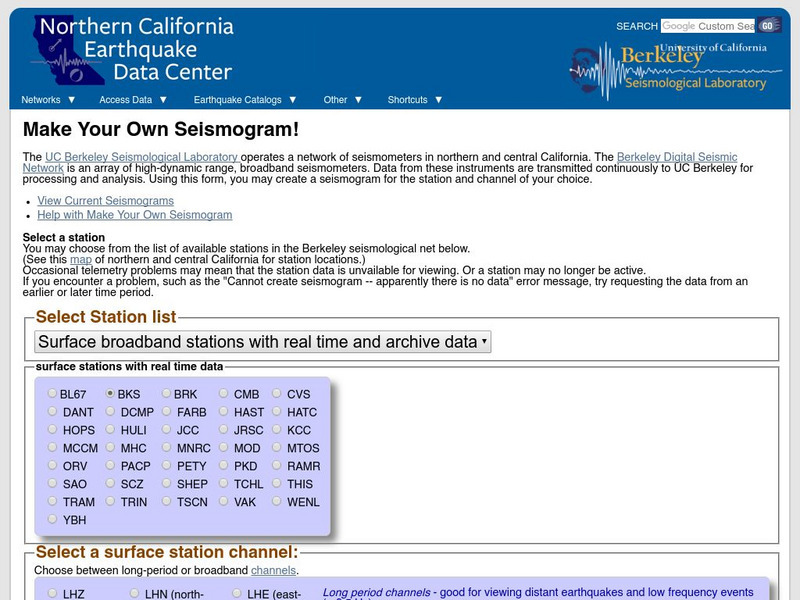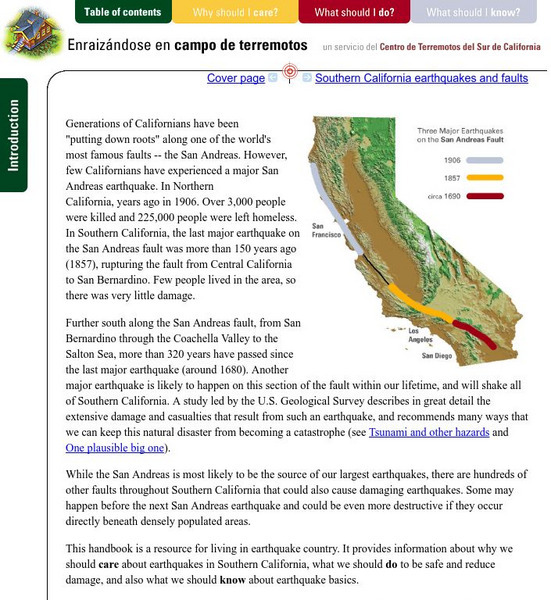Hi, what do you want to do?
National Institute of Educational Technologies and Teacher Training (Spain)
Ministerio De Educacion: Los Cambios en El Medio Natural Ii
In this unit you can learn about the deformation of rocks, magmatism, plutonism and seismic waves. It has 16 interactive activities.
Society for Science and the Public
Science News for Students: Big Rocks' Balancing Acts
Discusses research on balanced rock formations in California, which scientists believe can show information about severe earthquakes in the past, and whether certain areas are prone to them. [October 19, 2011]
Math Science Nucleus
Math/science Nucleus: Famous Earthquakes Animation
This animation reviews three famous historical earthquakes in a storybook format with pictures and animations, told from the perspective of three girls.
PBS
Pbs Teachers: Seismometer
Build an instrument for measuring movement to learn about how scientists measure the Earth's movement with a seismometer.
Math Science Nucleus
I. Science Ma Te: Integrating Science, Math and Technology
This site offers a wealth of online textbook-related materials that encourage the discovery of science in the world around us. Enter the site to access material on specific topics. Each section contains reading material (complete with...
American Association of Physics Teachers
Com Padre Digital Library: Physics to Go: Explore Physics on Your Own
Contains a full physics curriculum with links to games, webcasts, and activities. By creating a free account, students and teachers can create their own personal collection of resources.
PBS
Pbs Teachers: Deadly Shadow of Vesuvius
Observe the relationship among volcanoes, earthquakes and lithospheric plates by collecting data and creating maps. This activity was created to be used with the NOVA program, "Deadly Shadow of Vesuvius" but the video is not necessary...
Youngzine
Youngzine: Italy Suffers for Its Faults
Leran why the geology of Italy results in earthquakes in the region.
Other
Denver Museum of Nature and Science: Colorado's Forces of Nature
Students examine Colorado's forces of nature. Some topics explored are tornadoes, floods, blizzards, and windstorms. Images and video clips are included.
Other
Ncedc: Make Your Own Seismogram
This site from NCEDC gives you an opportunity to "make your own seismogram" by choosing from a number of options on the screen.
Other
New Mexico: Earthquake Education and Resources
This site from the New Mexico Bureau of Mines & Mineral Resources is a helpful online resource for the science classroom. Learn what an earthquake is, how it is measured, how we prepare for one. Also, locate additional links and...
Other
Noaa: National Geophysical Data Center Images Faults
This is a great slide show with real examples of the different types of faults.
Other
University of South Carolina: The Rapid Earthquake Viewer
Students can get access to data from seismograph stations throughout the world to locate recent earthquakes through the Rapid Earthquake Viewer(REV).
Other
K 3 Learning Pages: Tsunami Disaster
This site features several links to tsunami relief sites. Students and teachers can access information about the tsunami relief efforts through these resources.
US Geological Survey
U.s. Geological Survey: Earthquakes: Liquefaction
Maps and images that show liquefaction, the process by which water-filled sediment loses strength and acts like a fluid.
US Geological Survey
U.s. Geological Survey: Rock'n on Shakey Ground [Pdf]
The basics of earthquake science including factual information about how and why they happen. Also includes some hands-on activities and experiments for students.
NC State University
The Engineering Place: Earthquakes and Volcanoes
In this lesson, students simulate volcanic explosions using liquids of varying viscosity, and learn about volcano and earthquake zones around the world.
US Geological Survey
Usgs: November 29, 1975 Kalapana
Describes details of the earthquake of November 29, 1975 Kalapana in Hawaii, the tsunami, and the eruption of the volcano Kilauea as a result of the earthquake.
US Geological Survey
U.s. Geological Survey: Life of a Tsunami
Animations illustrating long-lasting tsunami waves once they strike a coast.
US Geological Survey
Usgs: Volcanic Hazards, Features, and Phenomena
Site from the U.S. Geological Survey provides a brief list of volcano terminology including descriptions as well as links to major menus.
US Geological Survey
Usgs: Natural Hazards Programs: Lessons Learned for Reducing Risk [Pdf]
This site provides links to articles about natural disasters such as volcanoes, earthquakes, landslides, floods, etc.
Scholastic
Scholastic: Study Jams! Science: Landforms, Rocks & Minerals: Earthquakes
A video and a short multiple-choice quiz on earthquakes, how they form, how they are measured, and the ways they can change the surface of the Earth.
Columbia University
Scientific Background on the Indian Ocean Earthquake and Tsunami
This site features information and related links that can be used by students and scientists to understand the events that led to the December 2004 Indian Ocean tsunami.
University of Southern California
Earthquake Country Alliance: Putting Down Roots in Earthquake Country
This handbook is a resource for living in earthquake country. It provides information about why we should care about earthquakes in Southern California, what we should do to be safe and reduce damage, and also what we should know about...




















